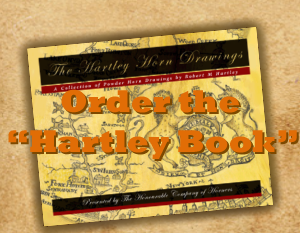July 2013 Message from the Guildmaster
July 7, 2013 by Jeff Bibb
Filed under Message from the Guildmaster
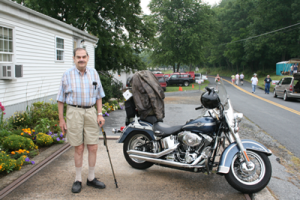
Guenther Kurth at Dixon’s Gunmakers Fair in 2008.
Greetings:
The summer seems to be flying by, or maybe it is the advent of older age, where one feels there is never enough time for everything. July 4th. is just past, and I spent another rewarding day at Poplar Forest where the holiday is celebrated in grand 18th. century fashion. This year Rick Sheets was able to join me and capably demonstrated traditional horn working for the many attendees. Our tables were crowded all day with folks asking questions, and experiencing something many had never seen before.
July signals the approach of another grand celebration, this one held annually in Kempton, PA. Yes, it is time for Dixon’s Gunmakers Fair! Mark you calendars for the 26th, 27th, and 28th. The Guild will have a table in the Accoutrements Tent. Please come by to say “hi“, purchase a raffle ticket, and spend some time with us. I ask once again that if you can spare an hour or two from the busy schedule, please help us out at the table. We will have an outstanding array of prizes for the raffle, Hartley books will be available for sale, and out newest publication about the accoutrement judging at Dixon’s will be unveiled and available for purchase. Contact Dick Toone if you can help out. I will be working at the table as much as possible this year, in addition to my duties as an accoutrements judge.
Plan to join us Friday evening at the Jacobsburg Historical Museum for our annual dinner. This year promises to be a splendid time. In addition to the dinner, tour the rifle museum, the house, and the new workshop, where the HCH has been teaching beginner and advanced horn making classes. The reservation form is available on our website.
Dixon’s has come to mean many things to many people. It is a time to gather and celebrate the heritage of our past. There are few places that one can find the level of talent and enthusiasm that is exhibited each year. In addition, how many venues offer the amount of knowledge that is available and freely passed along during the numerous workshops each year? The gun and accoutrement judging offer the opportunity to have your work reviewed by nationally known artisans who generously donate many hours each year. For three days one can wander the hillsides, trying to take in as many sights and experiences as possible, often making promises to themselves to return next year and see more.
My own experience with Dixon’s is perhaps more limited than some. I was taken there as a guest in 2007 by a family friend who made guns for many years. He firmly stated in typical Germanic fashion that I would attend Dixon’s with him and learn to make guns. There would be no other option. His optimism was fueled by his lifelong love for early antique firearms, their design, and creation. These were subjects he was very familiar with.
In 1957, a German citizen named Guenther Kurth and his wife, Gerta, packed their belongings and immigrated to North America. The walled division of Germany was drawing near, and he did not want to be held as a virtual prisoner in his own country. After settling in Ontario, Canada, they moved to Rochester, NY, where Guenther enjoyed a long career with Eastman Kodak as an engineer. In 1998, they retired and purchased a home next to our farm in Virginia.
During the 1970’s Guenther’s interest in traditional muzzle loading guns grew. In addition to his love for fine German guns, he developed a particular interest in American muzzle loaders… pistols. A .69 English Tower pistol was his first disappointing purchase. In addition to the sloppy workmanship, the lock was horrible, and would not spark. Guenther proceeded to dismantle the lock, professionally construct new internals for it, and make a new frizzen and springs. He now had a working gun, and shot it for many years.
Following this project, he discovered that there really wasn’t much available for him unless he made it himself. After buying some books he found about traditional rifles and pistols, he began making his own. Since he did not have good sources for parts for his guns, Guenther designed and made everything including his rifled barrels. He fashioned a small rifling machine for his pistol barrels, similar to the large devices used by the colonial gunsmiths. Working mostly from photos in books, and looking at original guns, he developed his own talent for duplicating the work of the past, and bringing it to life once again.
His particular love was the German wheel lock, a beautiful, but very complicated lock that many builder shy away from. Guenther located an old book written in German, that showed detailed drawings of the wheel lock mechanism. Following these drawings and photos of originals in museums, he constructed two wheel lock pistols, both first place Dixon’s winners.
During his gun making career, Guenther built several dozen flintlock and percussion pistols, along with his prized wheel locks. He made one Pennsylvania long rifle, several Hawken style guns for hunting, and a beautiful Jaeger rifle. Many of his pistols were first place Dixon’s winners. He once dryly joked that he was disappointed with his award at Dixon’s that year. His pistol had only won a second place ribbon….. but that it was okay since his other gun won a blue ribbon.
I suppose the most startling aspect of Guenther’s talent was the lack of machinery that he owned. In his basement workshop was a small metal lathe, a tabletop drill press, and a small metal band saw. Other than that, there were only hand tools, including his rifling machine. He usually made every part of his guns, carved and decorated the stocks, inlaid the silver wire, and engraved the metal surfaces. Following completion, he made cherry or walnut presentation cases for each one, shot them to be certain of their accuracy, and then started his next project.
Sadly, Guenther is now 85 years old, and stricken with Alzheimer’s. The disease has left him with almost no memory of his gun making friends, or the many beautiful works he created. He still smiles and heartily greets his friends, but conversations have become difficult and more halting than the times I remember so well.
For me, this type of talent exemplifies the true spirit of Dixon’s Gun Making Fair. There are many artisans working today who exhibit this level of skill and art in their work. Many of them are not as young as they used to be, and there does not seem to be many younger people taking up the craft. It has been said that we are in the midst of another golden age of traditional gun making. I hope that we treasure it as we should.
I look forward to seeing all of you later this month. As usual, your comments, suggestions, and criticisms are always welcome.
Thank you,
Jeff Bibb
Guildmaster
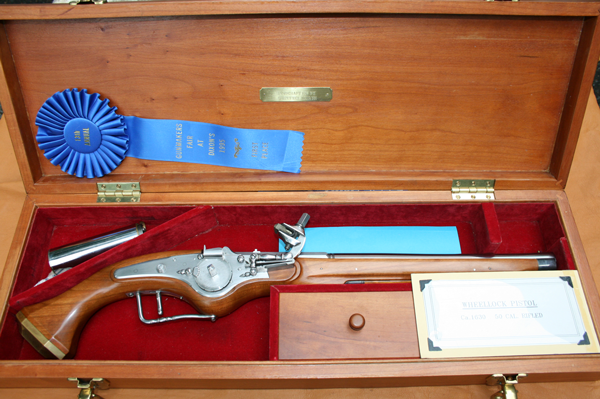
Guenther Kurth made wheel lock pistol.
June 2013 Message from the Guildmaster
June 4, 2013 by Jeff Bibb
Filed under Message from the Guildmaster
 Greetings:
Greetings:
Summer has arrived in central Virginia with a vengeance. Temperatures in the upper 80’s are combined with frequent showers and thunderstorms. The humidity is approaching its normal sticky level of discomfort. This year also marks the return of the cicada, and we are assaulted with a loud thrumming drone each time we step outside. Interestingly, cicadas seem to be some kind of delicacy for the local dogs. Our dog, Sparky, can consume a couple of dozen on his walk. This must be the canine equivalent of oysters on the half shell.
With the warm season, our local snake population also emerges. This year, there seem to be more copperhead snakes than usual. A little investigation revealed that one of their favorite foods is the cicada. Yesterday, one of our friends was bitten by a copperhead while walking in her yard, carrying some plants. She had neglected to put on her normal work boots, opting for sandals instead. She calmly retrieved a shovel, annihilated the offender, went inside and looked up her plight on Google, and then called us. Jan drove her to the hospital where she was treated with anti-venom and kept for the night for observation. This morning she reported that her leg is still swollen and colored with a mixture of black and blue hues. She is ready to come home as soon as they let her go. She promises to never chide me again for my healthy respect and distaste for poisonous reptiles.
During colonial times, snakebite was a real threat for many settlers and explorers. Medical practice at the time did not have an understanding of infections, cell destruction, and many other illnesses. Being bit by a poisonous snake could be lethal in a very real sense. While we in the modern western world take anti-venoms for granted, many countries around the world do not have this treatment available. As a result, their treatments harken back to older times and practices.
One of the most common treatments for snake bites in previous centuries involved consuming large amounts of alcohol. I suppose that the victim would be somewhat numbed from the pain of the poison. It was claimed that the alcohol counteracted the poison’s effects and vice versa. In addition a poultice of wet tobacco was often applied to the wound. This treatment is still in vogue today, since the largest majority of snakebite victims are young males who are severely intoxicated.
When I was young, there was an old Native American woman who lived on our farm and often helped my mother. Cal would often look after me at home if my mother needed to visit someone or run errands. She had a wealth of knowledge about the “old ways” including medical treatments. I remember her telling a story about her grandmother being bitten by a rattlesnake in the 1800’s. Her family got her very drunk and kept her that way for a week or more. She recovered and went on with her life.
Another common snakebite treatment was the application of plantain leaves, along with some powdered tobacco. Plantain plants and leaves are widely used in homeopathic treatments and much information is available regarding their use. Harts horn was another common item carried by colonial settlers as a treatment for various afflictions. Made from the shavings of deer antlers, the powder was mixed with oils as a tonic, or applied as a powder with a wet compress.
I suppose the most interesting snakebite treatment is one used in Asia. It is known as the three chicken method. A chicken is cut open across the breast and tied over the bite wound. It is noted that the chicken will become lethargic, short of breath, and then die. A second, and then a third chicken are applied to the wound in sequence. One wonders how many folks have passed away looking at a chicken tied to their leg?
The point of all of this is that these remedies have been proven to work in many cases. With some brief research, it appears that there is some scientific fact to back them up. Many are still practiced in remote and underdeveloped parts of the world. My grandfather maintained that there were plants on our mountainside that would cure anything, and that modern medicine was moving in the wrong direction. He may have been correct, but in the event of a snakebite, I think I’ll take my chances with modern treatment.
As usual, I welcome your comments, criticisms, and other observations.
All the best,
Jeff Bibb
Guildmaster
May 2013 Message from the Guildmaster
May 9, 2013 by Jeff Bibb
Filed under Message from the Guildmaster
Hello all:
Here in Virginia, spring has taken a turn backward. After a couple of weeks of warm weather, we are experiencing a week of much cooler temperatures, unending rain, and thunderstorms. May is traditionally much warmer here, but the month is still young, and we shall see what it brings for the next several weeks.
All if this is quite a contrast to the eighty degree weather that Jan and I recently experienced in southwest Louisiana. We journeyed there for the 27th annual Festival International de Louisiane in Lafayette. Many thousands of folks descend on the heart of Cajun country for this event each year. Downtown Lafayette is cordoned off for foot traffic, six or more performance stages are erected, local food vendors provide the best in Cajun and international cuisine, hundreds of artists from across the country show and sell an incredible array of artwork, and EVERYONE has a great time.
During the festival, all of the performers are introduced in French, and many of the songs are performed in French, and other languages. English is spoken as needed, but the focus is truly centered on the multinational flavor of the event. African drummers sing in their native languages, Celtic bands perform in Gaelic, The Soul Express Brass Band belts out lyrics in English, and the Cajun and Zydeco bands perform their traditional songs in French.
The entire festival highlights the proud individualistic spirit of the Louisiana French culture. The Cajun people (originally known as Acadians) were forced to leave their settlements in Canada by the British in the mid 1700’s. Thousands moved toward the south, and landed on the southwestern Louisiana bayous and prairies in the mid 1760’s. They settled into a somewhat isolated existence that allowed them to preserve their culture for hundreds of years. Threatened by the expansion of our homogenized world in the 20th. Century, they won the right to continue teaching French in their schools in the 1960’s.
This unique culture harkens to a time long ago. Many traditional Creole and Cajun customs are still practiced in this area of Louisiana, almost set apart from the rest of our country. The homogenized modern world makes this area stand in stark contrast to the rest of our nation. On Interstate 10, one sees restaurant signs for local eateries, not usually found on major highway markers. Hospitality is the rule of the day everywhere one goes. The local people welcome outsiders with an enthusiasm and politeness seldom seen in other regions.
In our modern time of mass media, electronic alienation, and selfish personal absorption, this pocket of culture seems refreshing in a sense that is difficult to describe. The people of this region have not lost their sense of pride, or the ability to communicate and share with others. These days, every marketing campaign tells us that we are not as good as our neighbors unless we have more money, sex, prescription drugs, and possessions than they do. The southwestern Louisiana culture reminds us of personal values, strong individualistic pride in their heritage, and times long past.
In many areas of our country, these values are quickly disappearing, if not already gone. We have become a nation of sheep, blindly following the consumerism and selfishness that is dictated by our society at large, while ignoring the values of our earlier times. Maybe we should take a long look at more simple lives that provide some true meaning to our existence.
As always, your comments, suggestions, criticisms and other insights are welcomed.
Thank you,
Jeff Bibb
Guildmaster
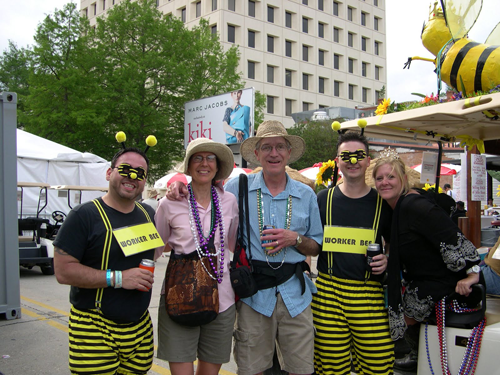
Guildmaster Jeff Bibb and wife Jan (in hats) enjoy Lafayette, LA.
April 2013 Message from the Guildmaster
April 11, 2013 by Jeff Bibb
Filed under Message from the Guildmaster
This Message was originally posted on the 8th of April. There was a small issue that necessitated this reposting.
Thanks, Rick Sheets (webmaster).
Greetings:
Spring is in the air. I don’t know about your part of the country, but in central Virginia the buds are popping, the grass is getting greener, and early flowers are starting to bloom. It is a time of rebirth, and growth, moving forward into maturity with the coming of summer. Fall will bring the dry browns, reds, golds, oranges and other colors. Winter will replace everything with its starkness.
As humans, we watch each year pass with growing awareness of our own birth, growth, maturity, and withering. How many of us long for the years when we could run as fast as we wanted, hike up mountains with little trouble, or work outside for hours on end with no ill results? When we were young, we felt invincible, time would never catch up with us, we had the world by its tail, and nothing could stop us. I believe many younger folks feel this and believe it will never change.
In middle age, one begins to see that things are perhaps not as rosy as we might have thought some years earlier. Aches and pains emerge that we could never imagine in previous years. Other health problems may surface that we have no control over. We can only hope that time will be good to us and that we will be able to accomplish some of the things that we dream of. The famous songwriter, Leonard Cohen perhaps said it best, “I ache in the places where I used to play.“ The inevitable is something we cannot change.
In older times, the death of a loved one was not treated the same as it is today. First, many people passed away at home. They were not put in hospitals or nursing homes, cared for by underpaid, overworked, and sometimes incompetent employees. In other times, family members would have taken care of the elderly and ill. They may have lacked the technological capabilities of our modern medical system, but I think they more than made up for it in compassion and understanding.
In modern times, following a loved one’s passing, we are bombarded with marketing schemes that truly astound me. First there is the “choice” of funeral homes and the services they offer. One must endure the explanation of the various “packages” that are offered including digital photo presentations at the funeral. The choices are overwhelming and have to be made during a very stressful and emotional time.
I believe the older customs had much to recommend them. The deceased was washed and dressed, often by family members, and laid out at home. Other family members and friends would come to call, bringing with them the best they could offer. Food, drink, and much conversation was the rule of the day. Whether the passing was untimely or expected, the same compassion and personal attention was expressed by all in attendance. Following the appropriate amount of time, a funeral was held, either in a church, or at a graveside, and the loved one was put to rest.
Our society has changed a great deal since the time of our forefathers. With modern laws and regulations, it has become difficult for folks to even die in a dignified manner. The failings of our healthcare system and the greed surrounding those who pass away from us are truly an example of a culture that has run completely amuck. I wish it was different, but I see no end to the degradation that we all experience.
Thank you,
Jeff Bibb
Guildmaster
March 2013 Message from the Guildmaster
March 9, 2013 by Jeff Bibb
Filed under Message from the Guildmaster
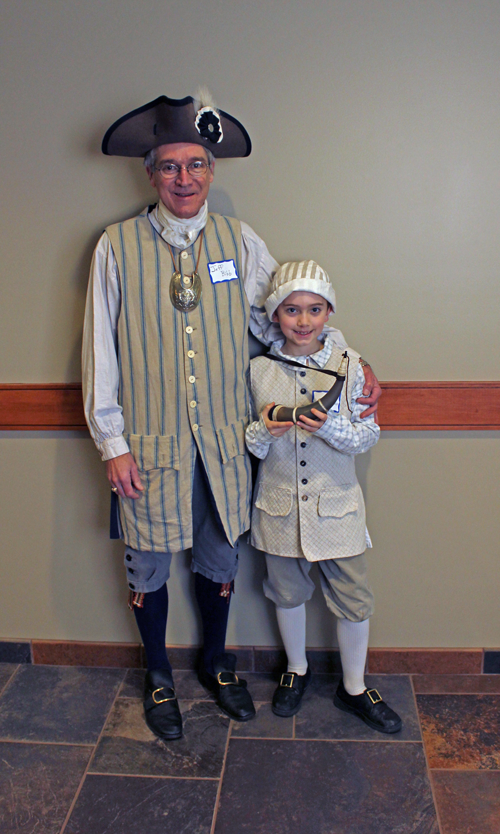
Jeff Bibb and Mitch Almason
Greetings:
I am still reeling from our annual meeting last weekend in Carlisle, PA. There was so much going on that it often became hard to keep track of it all. Between the excellent displays in the main room, the non-stop workshops in the hall, and Roland Cadle’s two thought-provoking presentations on Friday and Saturday, I believe we truly had something for everyone in attendance. The banquet on Saturday night was very enjoyable, and highlighted by the secretive work of the “Committee of Four” and their three benefactors. All of our past guild masters have now been honored in a magnificent fashion, and I wish to express my heartfelt thanks to the members who masterminded the awards. I am sure that more information will be published on our website and in the Horn Book for those who were not in attendance to witness these presentations.
After returning home, I was struck by several thoughts regarding our weekend of fellowship, and our lives in general. While in Carlisle, there was a general sense of calm that pervaded the conference. Folks milled around the display tables, asking questions, carefully examining horns, and enjoying themselves. Many were gathered outside at the workshops, often having the opportunity to try their hand at turning, carving, engraving, polychrome decoration, or other artistic pursuits. Everyone I saw was engrossed in their projects as if time stood still, and we were all catapulted back to an earlier, simpler period. Of course the fact that many attendees were attired in proper 18th. Century fashions helped the illusion.
As a child, I wonder how many of you thought that growing up to be an adult was a goal filled with “freedom?” We all thought that it would be wonderful to eat what we wanted, go to bed when we pleased, watch as much TV as we could stand, and generally operate our lives as we wished. Our young minds had a vision of adulthood that we now know never existed for our parents, our relatives, or their friends.
Our lives seem to become more and more complicated as we grow older. I know that I yearn for younger days when my responsibilities were no so great. Even as a teenager in the 1970’s, there always seemed to be time for friends, family, and everything else in my life. These days, I wonder how it will all get done. We rush from one thing to the next, send off emails at a frantic pace, take endless phone calls, try to get all of our jobs done around the house, and still make time for our friends and personal interests.
Horn work has proven to be a way to lessen stress. The hours spent carving, filing, turning, and perhaps decorating, move my mind away from many of the daily pressures that envelop us all. If you were at Carlisle this weekend, you only had to witness young Mitch Almason, who enthusiastically took in all of the workshops and instruction that were offered to him. At eight years old, he has already made a very nice horn (or two?), and was fascinated by the artisans offering their experience and talent for his benefit. I wish that as adults, we could open our minds as he did to slow down, forget the other pressures in our lives, and just enjoy the experience of learning and sharing.
Previously, I have written something to the effect that we should pay more attention to the lessons of our elders. Perhaps we should also pay more attention to being a child, existing in that “wondrous” state that allows us to absorb and learn without questioning everything that we see, or allowing our lives to interfere with the process. As horn workers, and as human beings, I think we might all be a bit better off.
Until next month, thank you. As always, comments or other thoughts are always welcome.
Your most humble servant,
Jeff Bibb
Guildmaster
February 2013 Message from the Guildmaster
February 5, 2013 by Jeff Bibb
Filed under Message from the Guildmaster
Greetings: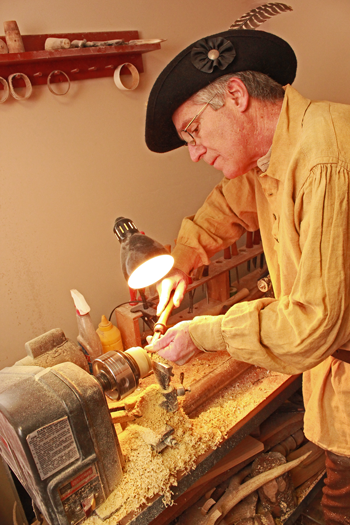
In late winter or early spring, a lot of folks look forward to the celebration of Mardi Gras in new Orleans. This annual event reaches a fever pitch with Fat Tuesday, the day before Ash Wednesday, the first day of Lent. For a century or more, one particular faction, the Mardi Gras Indians, make their yearly appearance in elaborate costumes they have labored over since the previous year. These costumes typically feature hundreds of brightly colored feathers and beadwork, often denoting some important event in their lives, their relatives’ lives, or their ancestors. The music they perform is directly linked to traditional Native American chants and songs, which they have passed down for well over a century.
The Mardi Gras Indians have a long history in New Orleans, much of it shrouded in secrecy and links to cultures long since extinct in the region. Modern Mardi Gras Indians are of African American descent. Originally barred from participating in the parades by the formal society of the New Orleans Krewes because of their race, they adopted the persona of the Native Americans, both in their costumes, and their songs, as a way to express their own persecution in the land where they lived.
Traditionally, the Indians are led by the Spy Boy, Flag Boy, and then the glorious appearance of the “Big Chief”. There is always a large back line of followers who parade with the Indians, sing the chants and songs, and support the effort. In earlier days the Indian parades were noted for violence, sometimes fatal, as the occasion offered an opportunity to settle scores with rival tribes who had spurred social or personal disagreements. In modern times, the tribes meet on the streets, send out scouts to gauge the temperament of their “adversaries,” and then politely acknowledge each other’s presence as part of the celebration. It is a fascinating cultural performance, and I suspect that those who have witnessed it, have been struck by the power and intensity of it.
A couple of weeks later, on St. Josephs night, the Indians once again venture on the streets to parade, chant, and sing, this time in a more private setting for their activities. It is documented that the Indians restrict themselves to their own ward neighborhoods, and the crowds of the previous Mardi Gras parties are not present to witness their performances. Following this final night, they retire to their homes and clans to prepare for the next year’s festivities.
Mardi Gras is immediately followed by Lent, a traditional Christian period of sacrifice, leading up to Easter. In modern times, we are admonished to “give up” something that we perceive as important in our lives for the several week period prior to Easter. Lent is an old custom that I think many have forgotten or forsaken in our modern world. In earlier times, I expect it was taken much more seriously, and the sacrifice would be viewed more importantly. Today, what exactly do we give up in the spirit of the season? For a few weeks, it would be a terrible inconvenience to not stop by Hardees on the way to work for that sausage biscuit. Perhaps those two glasses of wine in the evening could be overlooked for a while… oh the inconvenience and suffering of it all.
When one thinks of our ancestors, this type of sacrifice may have been much more serious. Food was always a struggle for many folks living in remote areas, and cut off from urban civilization. Alcohol was often enjoyed by more wealthy citizens, but not taken for granted, since almost everything was made by the folks living in a particular area. I suspect that giving up any part of a much simpler life was a greater impact than we can imagine in our time of convenience and rampant consumption.
One only needs to look around our households to see how much we accumulate, and how much is not really needed in our lives. As Jan and I contemplate a move this year, we have been looking at the “things” we have in our home. I am often amazed at the sparse furnishings and decorations depicted in modern interpretations of colonial and early American homes. Furniture was a real luxury, and there was not a lot of it. Functional pieces like tables and chairs were common, perhaps there was a larger storage cabinet for the meager amounts of kitchen ware and china that might have been present. Bedding was necessary, but not as fancy or elaborate as our modern pieces. Paintings and decorations were enjoyed by the more affluent, but not to large degrees except in extremely wealthy homes.
Perhaps this year, we should all take a look at what we have, and maybe what we can do without. I expect that the results will be revelatory in more ways than one. I know that many folks who live simpler lives with less material possessions seem to be much happier. Of course, consuming less makes our impact on the land and our resources much less demanding. Maybe Lent has a way of teaching what many have forgotten. I think this may have been much of its original message.
In closing, I look forward to seeing many of you at our annual meeting in a few weeks. I have enjoyed serving as your Guildmaster for the past year, and I hope that my service has been valuable to the guild and its membership. I have enjoyed writing these messages each month, and sincerely hope that I have provided something to think about with each one. I always welcome your comments, and appreciate the ones I have received. Thank you for your support, and for your participation in our organization.
Your most humble servant,
Jeff Bibb, Guildmaster
January 2013 Message from the Guildmaster
January 10, 2013 by Jeff Bibb
Filed under Message from the Guildmaster
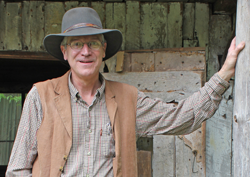 Happy New Year!
Happy New Year!
As I sit and write, I glance outside our upstairs window at the mountainside before me. Winter brings a special beauty to the mountains of Virginia. Often noted for their blue color, this time of year imparts a purplish cast that I cannot help but think of as somehow more striking than usual. The early settlers named these mountains for their color, and I suppose their first glance may have occurred in a warmer season. With the leaves gone, the stark ridges, valleys, and features stand out in detail not seen in the spring and summer.
Years back, my grandfather often commented that I would see lights at night all over our mountainside. He had grown up here in the early 1900’s and witnessed many changes in our area through his long life. He saw the invention and proliferation of the automobile, among many other “modern miracles.” A competent and proud driver, he piloted the first school bus in Amherst County in the 1920’s, ferrying students of all ages in a green Model T Ford truck with wooden seats facing out on each side of its body, and side curtains to keep out inclement weather. Often the bus would stick in the mud, and he would enlist the help of his young male passengers to help free it from the mire on our rutted back country roads. Tow trucks were just not available in those times.
He clearly foresaw the spread of our population and its encroachment into the less settled and developed areas of our countryside. Last week, to celebrate the new year, a couple of good friends drove with us to the top of our mountain at night. At 2900 feet of elevation, the mountain top offers a view of Lynchburg and surrounding areas that few folks witness. I had not been there for a few years at night, and was stunned by the number of lights and corresponding sprawl that we witnessed. As I stood and thought about what I was seeing, I could not help but think back to earlier times that I have witnessed in our county.
A suppose I really miss the simpler times of my youth. Going to a restaurant, and having a meal “out” was a special occasion that happened only several times a year. Talking on the phone was not necessarily an everyday occurrence, nor was driving. Other than my father going to work every day, it was not uncommon to pass several days before the need to drive somewhere occurred. My mother cooked our meals at home. McDonalds did not make its presence known in our area until later in the 1970’s. TV was a privilege that came a couple of times a week, not every waking moment. At that time, our TV got one channel, far away in Richmond. Home computers, smart phones and tablets were not even imaginable to most of our population.
As our ancestors explored and settled our vast country, I wonder how many of them could imagine the spread and growth of our population and its corresponding impact on our natural resources? I expect that some were able to see the inevitable expansion of cities since these areas attracted immigrants with their comparative wealth and accessible resources. Thomas Jefferson was noted for his visions regarding our country’s growth. Jefferson believed that our country would eventually mature and grow as a largely agrarian society. He did not foresee the growth of urban areas where the inhabitants were completely reliant on outside resources for their daily existence.
All of this has led to an unimaginable level of material consumption for much of our population. Our citizens rely on the products of others, not on their ability to care for themselves. For the coming year, as responsible presenters of past times, we should reflect on our own lives and the impact we have on our land. We only get one world to live in, and we can help educate others about responsible use of it. My grandfather was right; there are now a large number of house lights on the mountainside each night after dark. I think our elders deserve a lot more credit than they receive.
Thank you,
Jeff Bibb
Guildmaster
December 2012 Message from the Guildmaster
December 6, 2012 by Jeff Bibb
Filed under Message from the Guildmaster
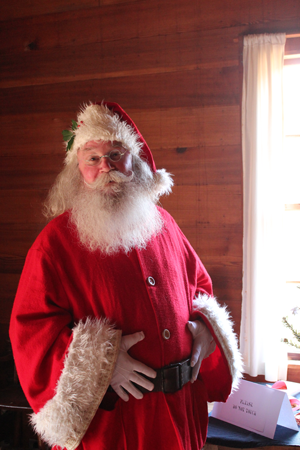 A Merry December to you all:
A Merry December to you all:
I say this from a traditional view, having recently spent some time reading Harnett T. Kane’s wonderful book, The Southern Christmas Book, first published in 1958. Kane traces the origins and practices of our earliest settlers from the 1600’s onward in areas ranging from Virginia to Maryland, New Orleans and Florida, and everywhere in between. After reading this book, pinning down a date for “Christmas” becomes as likely as shooting a flying duck with a blindfold on. If you have not read this book I highly recommend that you search it out on one of the book-locating services.
From the earliest days of the colonies in Virginia, Christmas was vigorously celebrated by almost all of our ancestors. Early Virginians embraced the Christmas “spirit” with a fervor that was hardly to be found in other areas. In addition to the consumption of various richly prepared meats, fried oysters, desserts, and various alcoholic beverages, the custom of eggnog was a holiday tradition not to be missed, and much enjoyed as revelers made their way to various households on their annual visits. Eggnog was traditionally made with eggs, cream, milk, and several varieties of spirits and was deemed “not quite the thing for maiden cousins….”
In addition to food and merriment, Virginia is also known for a rather quaint Christmas tradition that seems to have faded from popularity in more recent years. It is noted that Virginians turned to firearms to signal the season in a most boisterous fashion. To quote Mr. Kane, “a Virginia guest often brought his musket with him when he went to make a call, and joined his host in shooting while the women put their hands over their ears and the children jumped up and down in delight. When a neighbor caught the echo, he took his own firing piece and answered, and his neighbors did the same.” This tradition apparently continued in more rural areas until well into the 20th. Century, and seems to have survived even today. It seems that some authorities had to warn their constituents not to use too much gunpowder in their celebrations.
Holiday toasts were of course quite common, and expected. Many toasts were made while facing the fire with various parts of the body,…. front, back, and each side, to prolong the toast, the drink and the warmth. Perhaps in the best spirit of this practice is the famous toast made by our first president, George Washington, who simply toasted, “All our friends.”
In other areas, Christmas was marked in varying celebrations that echoed the traditions of the country from which its inhabitants had immigrated. In Maryland, a meal of sauerkraut and turkey was the common denominator. In some areas, the Germanic St. Nickolaus arrives with his frightful helper in early December, while in Louisiana Christmas arrives in February or March. Many of these celebrations are noted for large parades, contests, dancing and visiting.
One theme that shows up repeatedly in early Christmas celebrations is that gift giving was not a general practice. Children sometimes received a small item, a piece of special fruit or other token. Adults did not generally exchange gifts in early days, but took much pleasure in fellowship with their family and friends, meals, holiday activities, and traditional customs. In today’s world it is hard to imagine a time such as this. I wish more of our population would embrace the holiday as it was once celebrated.
In this season of tradition and heritage, I hope that all of you will enjoy some celebration of the traditions that our ancestors held so dearly. Hopefully, some of the values of friendship, community, and simplicity may outweigh the extravagant material consumption that seems to mark this time of year for many of our citizens. I know that you will at least breathe a sigh of relief that you are reveling in the wonderful spirit of our past., and not taking out loans to pay off enormous purchases!
May you all have the best for the season and the coming year. Thank you.
All our friends!
Jeff Bibb, Guildmaster
November 2012 Message from the Guildmaster
November 5, 2012 by Jeff Bibb
Filed under Message from the Guildmaster
Some thoughts on November 2012:
Is it just me, or are most of you completely worn out with the mindless hullabaloo surrounding this election? It seems that one cannot go more than an hour without the phone ringing and demanding our attention as to who does what better, and who is more honest, and who has the capability to lead our country in the right direction for the next four years. Whether these messages are delivered by a “live” person or an automated system, I am jaded by the whole thing at this point, ready to get over it and go on. May the best man win..… and I really don’t want to hear too much more about it.
Of course in past times, I suppose the candidates would have boarded trains (latter 1800’s) or ridden in carriages or on horses, (1700’s / early 1800’s) and delivered their messages to the populace as best they could before retiring to their respective homes to hear the results. I guess this is where the old term of “stump speeches” comes from. This might have taken a while in previous times, but then who was in a real hurry? Whatever newspapers existed at the time would have dutifully reported the opinions and promises of the politicians, folks would discuss these issues, and decide their positions and vote. Of course the amount of money spent on these campaigns would pale in comparison to the endless millions of today’s times.
These days, everyone is in a hurry, and seem to accomplish little. Our electronic age has delivered some definite benefits in terms of communication capabilities and ability to transmit information to others in a speedy fashion. But, have the results truly been beneficial? If you wonder as I do, look at the reaction times in the modern stock market. The DOW can fall hundreds of points in minutes because some high-tech company had a hiccup the previous day. One wonders what type of “productivity” these companies have anyway? What does one do all day besides sitting in front of a computer, receiving and transmitting information. Whatever happened to real jobs of the past, where accomplishments could actually be seen at the end of the day, not buried in some electronic never-never land that really doesn’t exist?
As our Thanksgiving season approaches, I am thankful to be involved with a group of people who value much more than the frustrating turmoil our existence seems to have become. The historical community is largely made up of folks who can slow down, and appreciate the value of a time that will never exist again. We can take the time to appreciate others as we hope they will appreciate the time we spend with them. I cannot help but think this is a far better approach to life than thumbing out a text message while eating dinner with a spouse, friend, or other associate.
 Six years ago, a small dog wandered on our farm in early November. I came home to find my wife, Jan, raking leaves while he sat patiently, along with our Labrador retriever, Zora Neale. He wanted nothing more than our love and attention. Several days later, it became apparent that he was the victim of “abuse” and really needed a home. We negotiated his release from his former residence, and Sparky has been with us ever since. Caring for others, whether animal or human, means more than anything our modern world can supply. I think that perhaps this is more of the message our original Thanksgiving celebrations imply. I wish you the best this season.
Six years ago, a small dog wandered on our farm in early November. I came home to find my wife, Jan, raking leaves while he sat patiently, along with our Labrador retriever, Zora Neale. He wanted nothing more than our love and attention. Several days later, it became apparent that he was the victim of “abuse” and really needed a home. We negotiated his release from his former residence, and Sparky has been with us ever since. Caring for others, whether animal or human, means more than anything our modern world can supply. I think that perhaps this is more of the message our original Thanksgiving celebrations imply. I wish you the best this season.
On a different note, this coming weekend, our Executive Committee will gather for its annual fall meeting. We have a number of topics to discuss, and our goal is to help the HCH grow and mature as best it can in the coming years. Our organization was founded to promote traditional horn work, and to educate others regarding its historical importance. Your input and participation in the guild is vital to its success. I encourage all of you to consider volunteering in the future to help us grow and achieve the goals of our unique and valuable organization. Of course, many thanks go out to those who have worked hard in the past and present to make us what we are today. Our thanks go out to all of you in this season of Thanksgiving.
All the best,
Jeff Bibb
October 2012 Message from the Guildmaster
October 4, 2012 by Jeff Bibb
Filed under Message from the Guildmaster
Greetings once again:
In Virginia, October is in the air. The leaves are starting to turn golden browns, and bright reds, while beginning to cover the yard and driveway. Acorns rain down like a bad hail storm. If the old stories about the amount of acorns relating to a severe winter are true, we are in for a doozy.
The chestnut crop has almost ended for the year. We are blessed (or cursed, depending our your perspective) with three large trees that produce an inordinate amount of wonderfully flavored nuts. Jan roasts then almost daily and barters (or gives) them to our friends in exchange for other wonderful treats that they produced in their gardens and yards.
This year we purchased tomato plants from a Mennonite nursery in Stuart’s Draft, Virginia. Once does not usually expect all of the plants to survive, but they did, and we were overwhelmed with large quantities of beautiful produce all summer long. Once again, friends traded various peppers, vegetables, and other goods for our bountiful supply of tomatoes. Many of their plants did not mature, and they needed fresh tomatoes for the table. No money was ever exchanged, and none was expected from either party.
All of this has been great fun. Our friends got what they needed, and so did we. One has only to think of several hundred years ago when this was an everyday occurrence. One person might have a surplus of tobacco, while the local blacksmith was able to make something needed for the farm. A barter was struck, and everyone was happy. I believe this system is as old as mankind, and it has survived for many centuries, largely unchanged.
With our love of traditions and history, this system fits into our everyday lives very well. I wonder if many of you practice this too? The impact on our world lessens as folks work together to share and help each other. Our reliance on the capitalistic system we have created lessens, and our need for the almighty dollar decreases as well. In addition, we consume (buy) less hard goods that end up littering our world when they are discarded. Regardless of the litany of economic opinions and forecasts that preach we must “spend” more to benefit the economy, I think we would all be better off reducing our consumption, rather than increasing it.
Our ancestors may have not enjoyed the luxuries that we take for granted these days, but I think many of them lived fulfilling lives. They worked hard, they valued their friends and families, and they worked to treat their peers fairly. I have no doubt that many lasting friendships were struck from a barter or a service that was traded well. It is something to think about in our modern times as we rush through our lives driving from one big box store to the next.
As usual, comments, criticisms, suggestions, or other observations are always welcome. I hope you have a glorious fall season.
All the best,
Jeff Bibb
Guildmaster




